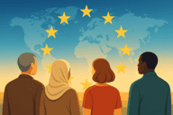The European Union was founded as a peace project. After two world wars, its architects believed that cooperation and solidarity could secure a different future. They were right. For more than seventy years, war between member states has been unthinkable. Peace, democracy, human rights, and equality became the values that defined Europe and gave it moral weight in the world.
That legacy is now under strain. With war raging on our doorstep fear has returned to Europe. President von der Leyen’s State of the Union speech reflected this anxiety. She spoke of battles to be fought, of resilience to be hardened, of power to be built. The tone was combative, but is this the best way for Europe to present itself?
Language matters. Strong words can rally resolve. But they can also fan the flames of fear. And politics framed around fear can quickly slip into the demonising of the other. We see it in parts of Europe today. We have seen it before, and we know where it can lead. The Union was founded precisely to break that cycle. If it now mirrors the rhetoric of division and fear, it risks betraying its own foundations. Defence and competitiveness now dominate the language of Europe, while the social fabric and solidarity that once defined the Union risk being sidelined.
We recognise the arguments for greater defence capacity, but insist that the deeper question is what we choose to defend. Territory and borders are important, yet they are not enough. The true strength of the Union lies in its values. If we lose sight of those, the European project itself is weakened.
There were positive signals in von der Leyen’s speech. She defended democratic values and media freedom, voiced concern for children caught in war, recognised the suffering of civilians in Gaza and Ukraine, and set out ambition to move away from fossil fuels. Her commitment to hold violators of international law to account was a reminder that justice is the foundation of any lasting peace.
But there were important omissions, pointing to the need to recall that Europe’s strength lies in its role as a champion of rights and values. Conflicts such as the one in Sudan, driving millions into displacement and hunger, went unmentioned, as did wider humanitarian crises across Africa, Asia, and Latin America. Poverty and exclusion within Europe were barely acknowledged. The slow, patient work of peacebuilding, reconciliation, and trauma healing was overshadowed by military rhetoric. And civil society – local organisations, NGOs, faith actors, human rights defenders – was absent, despite being indispensable for defending rights, supporting communities, and upholding democracy. These are the voices that give Europe credibility, both at home and abroad.
If Europe is serious about leadership, it must address these gaps. Peace must be pursued with the same urgency as defence. Humanitarian aid must be scaled to today’s unprecedented levels of need. Civil society must be protected and given a real place at the table. Climate action must be carried out in a spirit of justice, ensuring the transition to clean energy improves lives rather than deepening hardship.
President von der Leyen was right to say that Europe is in a fight for democracy, for freedom, for unity. That is a fight worth waging. Yet to be true to its founding vision, it must also be a fight for justice, for peace, and for the dignity of every person. The signals in her speech on democratic values, media freedom, protecting children, and moving away from fossil fuels point in the right direction. Europe’s credibility and its future will rest on whether it embodies peace, justice, and the dignity of every person, everywhere. This is the Europe that once drew strength from its values, and must do so again.



